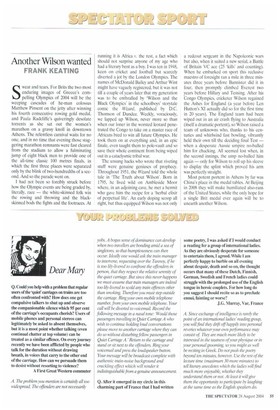Another Wilson wanted
FRANK KEATING
Sweat and tears. For Brits the two most enduring images of Greece's compelling Olympics of 2004 will be the weeping cascades of he-man colossus Matthew Pinsent on the jetty after winning his fourth consecutive rowing gold medal, and Paula Radcliffe's quiveringly desolate torrents as she sat out the women's marathon on a grassy knoll in downtown Athens. The relentless carnival waits for no one, and in no time that evening those staggering marathon remnants were fast cleared from the stadium to allow a fulminating jump of eight black men to provide one of the all-time classic 100 metres finals, in which the first three places were separated only by the blink of two-hundredths of a second. And so the parade went on.
I had not been so forcibly struck before how the Olympic events are being graded by, literally. race — the white-skinned folk win the rowing and throwing and the blackskinned buds the fights and the footraces. At running it is Africa v. the rest, a fact which should not surprise anyone of my age who had a literary bent as a boy. I was ten in 1948, keen on cricket and football but scarcely diverted a jot by the London Olympics. The names of McDonald Bailey and Arthur Wint might have vaguely registered, but it was not till a couple of years later that my generation was to be enthralled by 'Wilson and the Black Olympics' in the schoolboys' storytale comic the Wizard, published by D.C. Thomson of Dundee. Weekly, voraciously, we lapped up Wilson, never more so than when our loner in the worsted leotard penetrated the Congo to take on a master race of Africans bred to win all future Olympics. He took them on at everything and, in an epic finale, even taught them to pole-vault and so save their whole continent from being wiped out in a cataclysmic tribal war.
The unsung hacks who wrote that riveting stuff were genuine geniuses of prophecy. Throughout 1951, the Wizard told the whole tale in 'The Truth about Wilson'. Born in 1795, he lived wild on Ambleside Moor where, in an adjoining cave, he met a hermit who gave him the recipe for a 'herbal elixir of perpetual life'. An early doping scoop all right, but thus equipped Wilson was not only a redcoat sergeant in the Napoleonic wars but also, when it suited a new serial. a Battle of Britain VC ace (25 'kills' and counting). When he embarked on sport this reclusive maestro of foresight ran a mile in three minutes three years before Bannister did it in four, then promptly climbed Everest two years before Hillary and Tensing. After his Congo Olympics. cricketer Wilson regained the Ashes for England (a year before Len Hutton's XI actually did so for the first time in 20 years). The England team had been wiped out in an air crash flying to Australia (itself a dramatic portent), so Wilson raised a team of unknowns who, thanks to his centuries and whirlwind fast bowling, vibrantly held their own till the deciding final Test — when a desperate Aussie umpire no-balled him for chucking. All seemed lost when, in the second innings, the ump no-balled him again — only for Wilson to roll up his sleeve to display the splint which proved his arm was perfectly straight.
Most potent portent in Athens by far was China's place in the medal tables. At Beijing in 2008 they will make humiliated also-rans of the United States, while the only hope for a single Brit medal ever again will be to unearth another Wilson.


























































 Previous page
Previous page